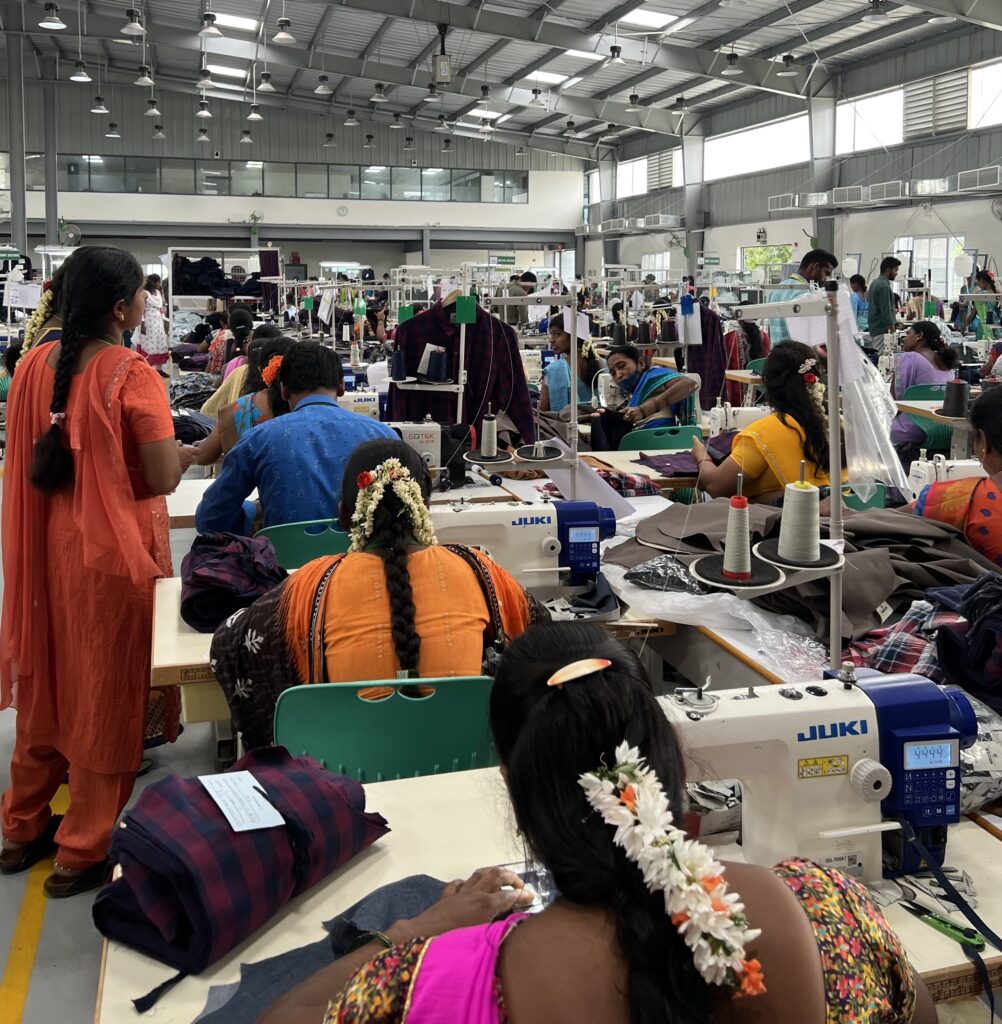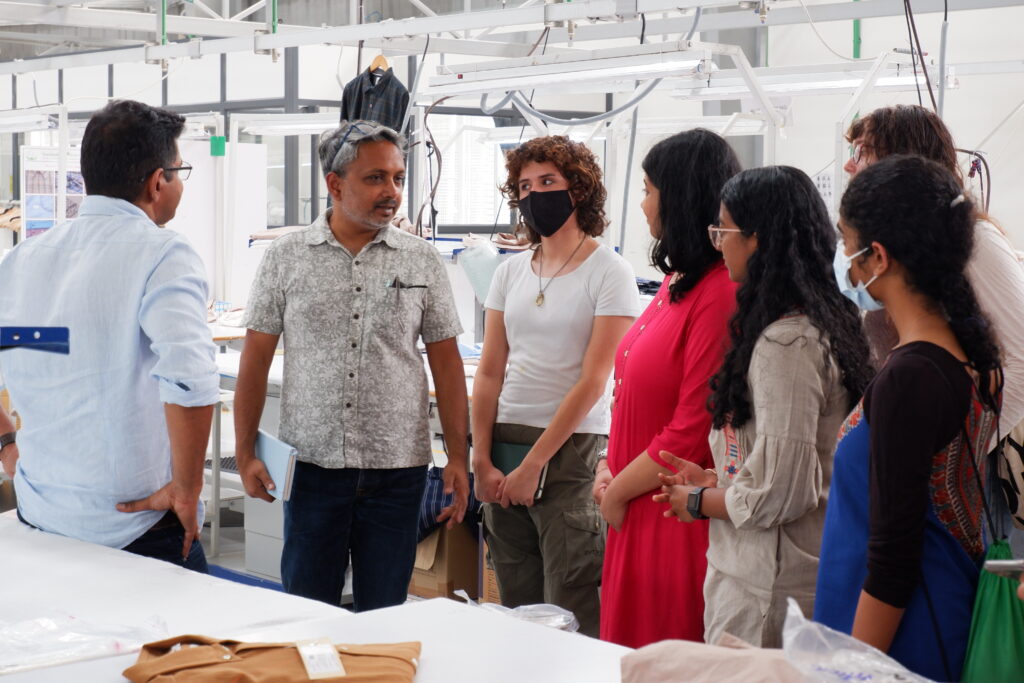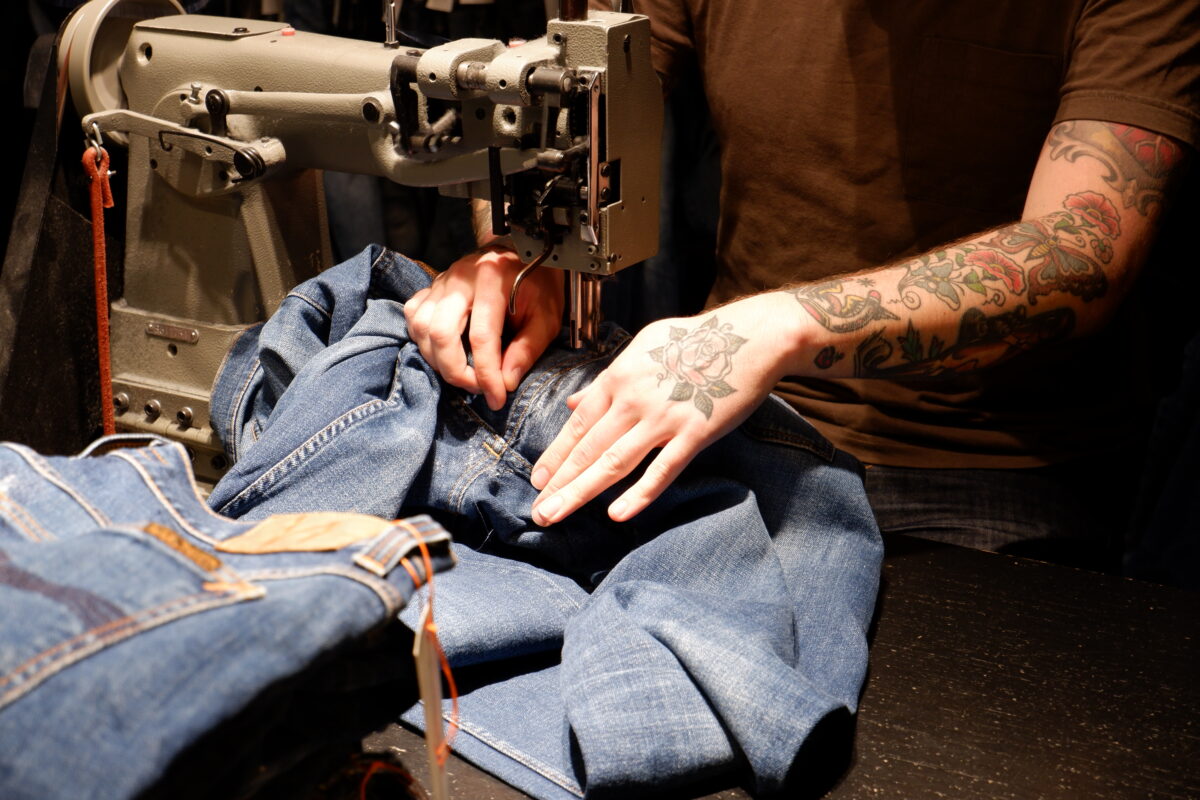In January 2021, sociology professor Sharmila Rudrappa and communications professor Shiv Ganesh decided they wanted to work together on a project looking at the ethical production and consumption of cotton garments. Ganesh was already at work on a project on ethical production and Rudrappa had worked with garment workers as part of her research on maternal surrogacy as an alternative to factory work.
In two days, they’d written a grant application that would win them the 2021–22 University of Texas President’s Award for Global Learning. Their project, “Cotton Threads: Fabricating Ethical Production and Consumption in the Garment Industry,” would take them, along with eight undergraduate students, from Texas to Sweden to India. Along the way they would follow the supply chains of organic cotton all the way from the retail stores and companies in Sweden to the Swedish jeans companies Nudie and Dedicated to the Indian factories where garment workers produced the jeans.
During the trip, students would not only meet with companies interested in sustainable fashion, but also trace this supply chain back to the factories where the garments were produced and hear from the garment workers themselves.
“I wanted to make visible the contradictions in organic cotton supply chains to students,” Ganesh said, “both in terms of what organic cotton and sustainability looks like in India versus Sweden and how sustainability is defined differently in different places.” For Rudrappa, “it was absolutely critical for my students to understand that the ways in which we consume garments actually leads to these larger structural issues that make conditions so unbearable that garment workers would go into surrogacy.” What transpired was a remarkable experience for the students and for Rudrappa and Ganesh.
“I wanted to make visible the contradictions in organic cotton supply chains to students.”
In Sweden, the students had the opportunity to meet with academics as well as the founders, design teams, and other employees at Nudie Jeans and Dedicated, the ethical garment companies with whom Ganesh had connections from a past project. After leaving Sweden, the group traveled to Bangalore, where they visited a factory that produces for the Swedish companies, and they also met with workers working in generic garment factories: “That’s where we sat on their floors drinking endless cups of tea one evening, talking about what this work meant for them and the future they saw for themselves,” Rudrappa said.
While their experiences in Sweden taught the students about the possibilities of ethical fashion, in India the students’ understanding of sustainability became more complicated as they met with the workers who produced the actual garments sold by the Swedish companies. “It pushed the students to move a little beyond thinking about organic cotton as this really nice, sort of happy substitute for industrial cotton,” said Ganesh, “and to get them to confront some of the deeper contradictions.”

According to Rudrappa, the visit to India allowed “the students to begin to understand how complicated and messy the notion of ethical consumption really is.” For instance, the students visited a handloom cooperative that works with khadi cotton. While not organic, khadi cotton is short staple and therefore uses less water, making it sustainable in a different way. Students were also forced to confront the fact that even for garment workers who are treated ethically by the manufacturers, it’s grueling work. Many of the garment workers the students met did not want their own children to pursue the same line of work; for them, sustainability wasn’t just about the availability of resources but also the sustainability of their livelihood and quality of life.
“If you actually want to assess how sustainable organic cotton is, you have to look around the chain, not just at the chain,” Ganesh said. “That’s why Sharmila took them to tailors that her family’s known for generations so they can understand what it’s like to actually develop a relationship with the person who’s making your clothes, and to use that to challenge an industrial mode of production.”

Along the way, Rudrappa and Ganesh and their students were met with incredible generosity. “We had academics giving us classrooms in universities in Sweden,” said Ganesh. “We had sustainable fashion companies inviting us onto their premises, throwing their doors open, literally feeding us.” In India, Rudrappa recalled, “we had garment workers in Bangalore making endless cups of chai as we sat on their floors.” While they did not intend to give their students lessons in generosity of spirit and reciprocity, the way the people they met engaged with them and their students was “the most wonderful thing about the project,” Rudrappa said.
In addition to teaching them about generosity, the project also tasked the students with a substantial amount of work, which included interviewing consumers and different sustainable fashion companies in Sweden and holding focus-group discussions in India facilitated by Rudrappa’s friends. This work ultimately culminated in a 75-page report that the students prepared together.
Ganesh was surprised by how receptive both Nudie and Dedicated were to the students’ report on alternative production and how open they were to the students’ ideas about what organic cotton could and couldn’t do.
The project did not come without its challenges, however. The scale of the project — which involved crossing continents and countries over four weeks in the middle of a global pandemic — proved logistically difficult and relied heavily on the administrative support of staff at Texas Global, especially Laura Caloudis, senior program coordinator, and administrative associate Margaret Rieley. An unexpected challenge arose when many of the students got COVID in India. Even this, however, became a learning opportunity, a course in how to care for one another. “What was remarkable for me,” Rudrappa said “was how much they all worked with each other and took care of each other and supported each other through this process.”
“We have encouraged our students to approach the world with a sense of cultural humility, which I think is something that we sorely need.”
In the future, Rudrappa would like to develop a course to introduce students to the realities of the garment industry closer to home, perhaps as it relates to the history and present of Black-owned farms in Texas. “What are the possibilities for ethical production in Texas?” she says. “I think there’s a lot to be learned right here.”
In the end, said Ganesh, the goal for the students, even as they traveled the world, was less about formulating solutions they could export than it was about the lessons they could bring home. “The motto of The University of Texas is ‘what starts here changes the world,’” said Ganesh. “In a sense, I think we’ve done the opposite of that, or interpreted it in a different way. We have encouraged our students to approach the world with a sense of cultural humility, which I think is something that we sorely need.”
